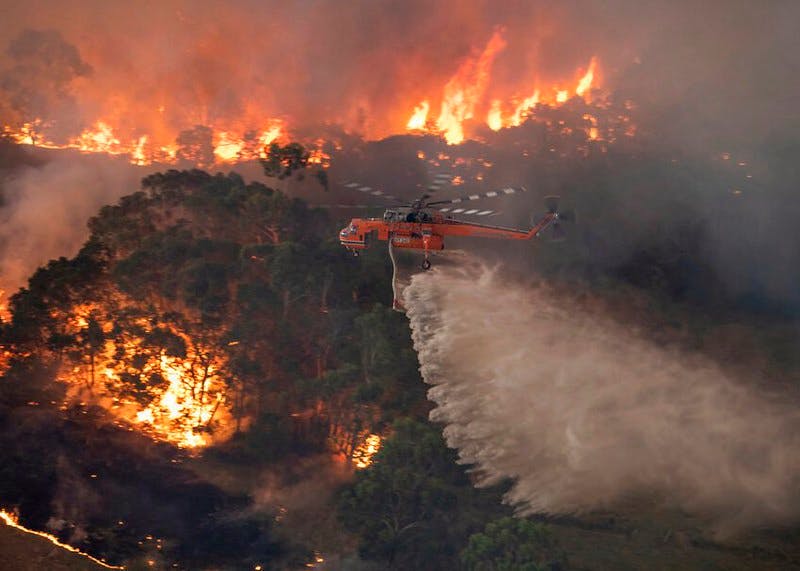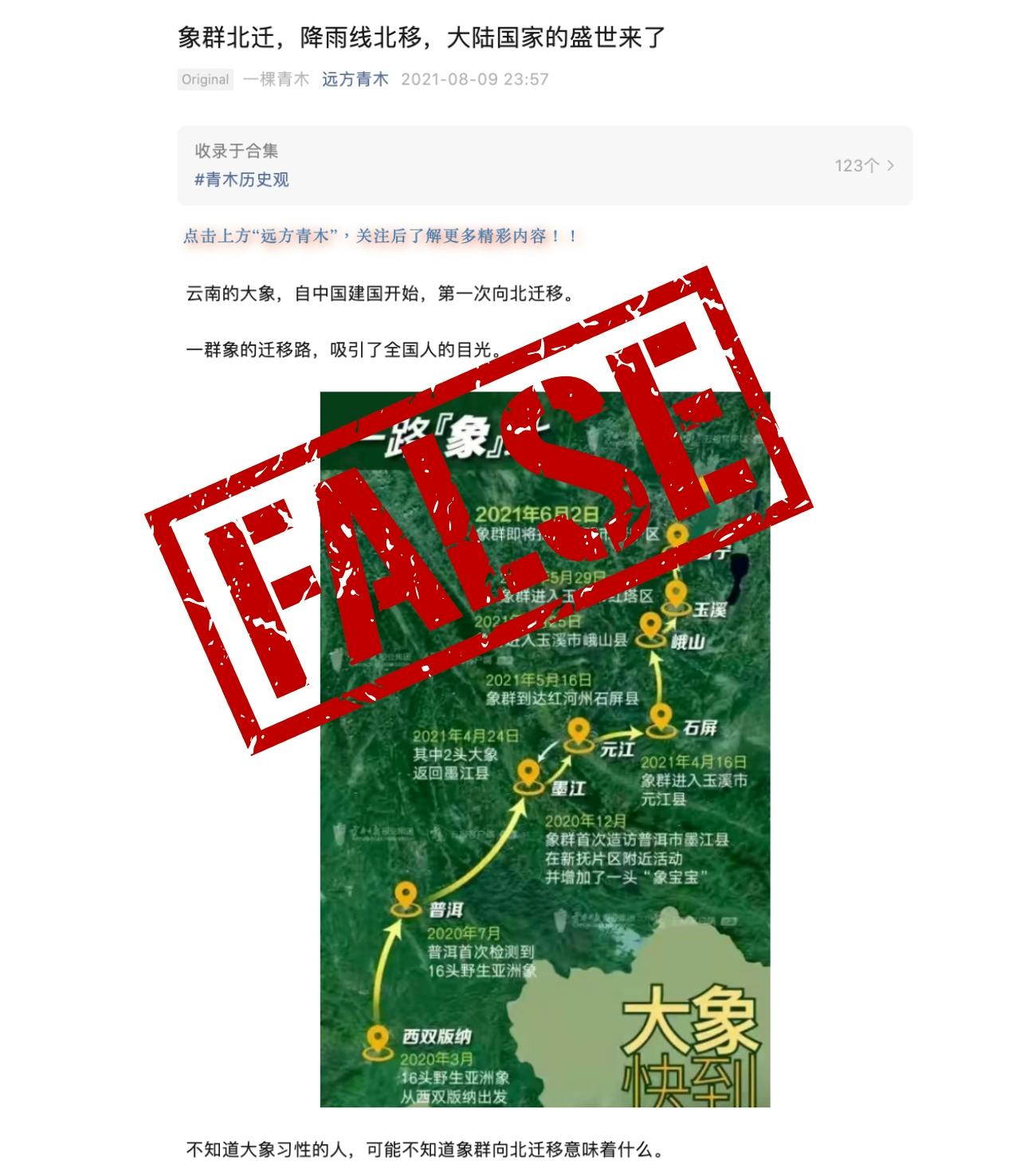Climate disinformation – where scientific data is misrepresented to erode trust in climate science – has been around since the 1980s, when fossil fuel companies ran advertorials in newspapers denying the existence of climate change.
To continue reading, subscribe to Eco‑Business.
There's something for everyone. We offer a range of subscription plans.
- Access our stories and receive our Insights Weekly newsletter with the free EB Member plan.
- Unlock unlimited access to our content and archive with EB Circle.
- Publish your content with EB Premium.
Today, climate disinformation is no longer limited to traditional media. The internet has become fertile ground for fabrications about climate change, thwarting efforts to curb global warming. Despite social media companies’ disinformation policies, such falsehoods often go viral.
From suspiciously-started Austrailan bushfires to carbon-locking Indonesian palm oil plantations, Eco-Business highlights seven climate disinformation campaigns from around Asia Pacific that have tried to misrepresent science and delay action.
1. Arson caused Australian bushfires
While Australia was struggling to put out bushfires at the end 2019, caused by years of severe drought and extreme weather, the authorities grappled with climate misinformation that spread like wildfire online.
Reports in social media falsely claimed that 75 per cent of the fires were started by arsonists. In reality, only 13 per cent of Australian bushfires each year are deliberately started.

A helicopter tackles a wildfire in East Gippsland, Victoria state, Australia. 2019 will be remembered as the year of unprecedented bushfires. Image: Ninian Reid, CC by 2.0
Queensland University of Technology researcher Timothy Graham told media outlet The Conversation that he identified troll and bot social media accounts that attempted to shift the narrative about the fires as criminal activity.
“We found many accounts using #ArsonEmergency were behaving ‘suspiciously,’ compared to those using #AustraliaFire and #BushfireAustralia,” he said.
“Accounts peddling #ArsonEmergency carried out activity similar to what we’ve witnessed in past disinformation campaigns, such as the coordinated behaviour of Russian trolls during the 2016 United States (US) presidential election.”
2. Sky News Australia’s false statements about the health of the Great Barrier Reef
Australia’s broadcast media regulator, the Australian Communications and Media Authority (ACMA), found in April that News Corporation Australia’s Sky News had breached codes of practice pertaining to fairness and accuracy by broadcasting misinformation in 2021.
In a news segment on Outsiders, a television news and commentary show on Sky News Australia, viewers were told that the Great Barrier Reef was “looking fantastic” and that the Australian Maritime Institute Science (AIMS) had said “there’s never been so much coral”.
The segment referred to a report from the Australian Institute of Marine Science (AIMS), which ACMA said had found an increase in coral cover but reported any recovery was fragile and at risk.
3. Greta Thunberg’s photoshopped images
Greta Thunberg, the face of the youth climate movement, has been a frequent target of disinformation.

Thunberg’s chin area was digitally manipulated to make her face appear much bigger than it is. Image: Annie Lab
Doctored photos of Swedish youth climate activist Greta Thunberg purportedly gaining weight started circulating in social media in China in April 2021, after she did not condemn Japan’s controversial plan to release contaminated water from the wrecked Fukushima nuclear plant into the ocean — a move which has irked China.
A Facebook post read, “Working in environment protection makes it easy to earn? A Japanese netizen found the environment-protecting girl already turning into Pompeo,” referring to former US secretary of state Mike Pompeo.
Another post widely shared on Chinese microblogging site Weibo falsely claimed that Thunberg “asked Chinese people not to use chopsticks” to save trees, which has been debunked by news agency Reuters.
4. Prosperity under rising temperatures theory
Another narrative, which implies that global warming could benefit China, has a historical spin. The theory asserts that Chinese dynasties enjoyed longer prosperity under warmer temperatures.

A social media post highlighting the correlation between prosperity and warmer temperatures. Image: Annie Lab
An article posted on instant messaging platform WeChat in August 2021 said the Qin and Han dynasties, as well as the Sui and Tang dynasties, were “the most prosperous,” and they developed “within a cycle of significant rising temperatures.”
A similar claim was posted on the video-sharing platform Xigua in April 2021. It said that during the Han and Tang dynasties’ relatively warmer climate, society was “relatively more stable and prosperous”.
In response, China Environment News, the official media outlet of China’s Ministry of Ecology and Environment said there was no scientific basis to the claims.
5. Equinox phenomenon will cause unbearable heat
Amid soaring temperatures in India in April 2017, false text messages made the rounds warning people that they will soon face unbearable heat because of an “equinox phenomenon”.
The rumour read, “The Equinox phenomenon will affect us in the next five days. Please stay indoors and keep animals indoors or protected especially from 12pm-3pm daily. The temperature will fluctuate and may reach 40 degrees Celsius. This can easily cause dehydration and sunstroke.”
An expert debunked the claims: “The first day of astronomical spring in the northern hemisphere was on 20 March. This is when day and night is almost of the same duration. It typically happens on 19, 20 or 21 March every year,” said P Raghunadan, president of the Plentary Society India.
This year, when India experienced its warmest February in 122 years, messages claiming that “heat waves like this are normal and happen every 1,500 years” circulated on instant messaging platform WhatsApp.
6. Lobbyists’ claim that oil palm plantations absorb more carbon than tropical forests
Palm oil plantations are better at absorbing carbon than tropical forests, an executive for the Indonesian government’s palm oil agency claimed in August, contrary to scientific evidence.
Speaking at the launch of a new programme to help smallholder farmers grow crops without cutting trees, Achmad Maulizal, head of corporate affairs for Indonesia’s Palm Oil Fund Management Agency said that oil palm plantations are superior to tropical forests in producing energy more efficiently, absorbing more carbon dioxide and producing more oxygen.
Professor William Laurance, an expert in land use, tropical forests and habitat fragmentation at James Cook University, said that oil palm plantations are not better at storing carbon than tropical forests.
Dismissing the claim as “goofy”, he told Eco-Business that carbon storage in rainforests can exceed 400 metric tonnes per hectare, not including the roots and belowground soil carbon, and even a mature oil palm plantation would lock in just a fraction of that – typically between 2-10 times less.
7. Whitewashing of ocean release of Fukushima wastewater
The Japanese government has said that nearly all the radioactive materials, barring tritium, will be removed from the wastewater using the Advanced Liquid Processing System (ALPS) before it is released.
But the American Association for the Advancement of Science said that more dangerous isotopes with longer radioactive lifespans, such as ruthenium, cobalt, strontium and plutonium – present in 71 per cent of the tanks on site – can slip through the ALPS process.
Robert Richmond, director of the Kewalo Marine Laboratory at the University of Hawaii, called the plan “ill-advised”, refuting the Japanese government’s claim that tritium would have a negligible impact on the marine environment.
Pollutants such as tritium can pass through various levels of the food chain – including plants, animals, and bacteria – and be “bioaccumulated,” meaning they will build up in the marine ecosystem, he said.

















